Fashion Sense 2025 Speaker Bios
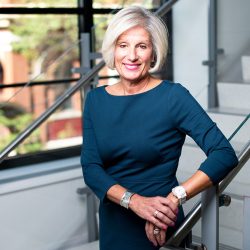 Caroline Genco
Caroline Genco
As Provost and Senior Vice President, Dr. Caroline Attardo Genco serves as Tufts University’s chief academic officer and is responsible for setting and guiding institutional priorities that advance the university’s mission as a student-centered, R1 institution. As Provost, Dr. Genco oversees Tufts’ eight schools as well as multiple cross-school programs, centers, and institutes, and works to champion and integrate educational and research activities across the university. The university’s education, research, faculty affairs, innovation, and institutional inclusive excellence operations report up through her office. She is the senior officer responsible for supporting the Academic Affairs Committee and the Student Affairs Subcommittee of the Board of Trustees, and she oversees the Boards of Advisors for schools and colleges and the International Board of Advisors.
Dr. Genco previously served as the Vice Provost for Research (VPR) from 2019 to 2021 and as chair of the Immunology Department at Tufts University School of Medicine (TUSM) from 2015 to 2019. In her role as VPR, she worked with faculty and university leadership to develop and implement strategic research priorities at Tufts, facilitated strategies to increase extramural research funding, and enhanced the university research structures and programs, while also pivoting to respond to opportunities and challenges as they arose.
As Chair of the Department of Immunology, Dr. Genco returned the department to fiscal sustainability and re-energized the research enterprise. She directed a strategic restructuring of the department to build on the wide-ranging strengths of faculty and to focus the research portfolio toward immune-mediated diseases. Dr. Genco also facilitated interactions and collaborations with investigators in schools throughout the university and Tufts Medical Center, increasing research funding focused on inflammation, the development of novel therapeutics for the treatment, and prevention of immune-mediated diseases.
Dr. Genco has an established record as an academic and research leader. Dr. Genco is a graduate of the Hedwig van Ameringen Executive Leadership in Academic Medicine (ELAM) Program, a year-long fellowship for women faculty in medicine, dentistry, and public health dedicated to developing the professional and personal skills required to lead and manage in today’s complex health care environment. She currently holds the Arthur E. Spiller M.D. Endowed Professorship in Genetics at TUSM and has a distinguished history of excellence in biomedical research. She has fostered numerous collaborations across disciplines including immunology, infectious diseases, epidemiology, biomedical engineering, and public health. Her research and translational work focus on chronic inflammation and the role of the microbiome in systemic inflammatory disorders, sexually transmitted infections, and oral infectious diseases. She has authored more than 130 scientific articles, and her research program has been continuously supported by the National Institutes of Health (NIH). She has served on numerous NIH scientific advisory committees and has worked closely with several pharmaceutical companies in an advisory capacity. She has an outstanding record as a teacher and mentor, having trained more than three dozen graduate students and postdoctoral fellows along with numerous undergraduate and professional school students.
Prior to her roles at Tufts, Dr. Genco held faculty appointments at Emory University, Morehouse School of Medicine, and Boston University School of Medicine. She received her undergraduate degree in biology from SUNY Fredonia in 1981, and earned her M.S. and Ph.D. in microbiology from the University of Rochester’s School of Medicine and Dentistry in 1984 and 1987, respectively.
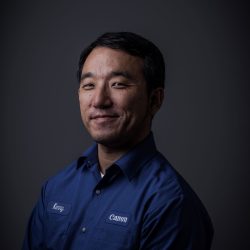 Kenny Iuchi
Kenny Iuchi
Kenny Iuchi, Senior Fellow of the Business Development Engineering division at Canon Virginia, Inc.(CVI)
Iuchi joined Canon, Inc. Sustainability headquarters in Japan as a chemical engineer in 2003 after receiving MS of Engineering and transferred to CVI in June 2013. After having several internal transfers, Iuchi joined Business Development Engineering in 2016. Since then, he has led several material related projects at CVI to incubate new business.
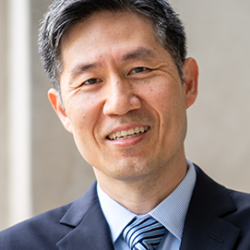 Kyongbum Lee
Kyongbum Lee
Kyongbum Lee is dean of Tufts University School of Engineering and Karol Family Professor in the Department of Chemical and Biological Engineering. He obtained his PhD in chemical engineering with a minor in applied mathematics from the Massachusetts Institute of Technology in 2002, and his BS in chemical engineering from Stanford University in 1995. He was previously chair of the Tufts Department of Chemical and Biological Engineering.
Lee has received honors that include election as a Fellow of the American Institute for Medical and Biological Engineering (AIMBE), Jay Bailey Young Investigator Award in Metabolic Engineering, invitation to National Academies Keck Futures Conference, and the Tufts University Graduate Teaching and Mentoring Award. He has held the elected positions of division director and area program chair for the Food, Pharmaceutical Bioengineering Division of the American Institute of Chemical Engineers (AIChE). He currently serves on the editorial boards of the journals Metabolites, Adipocytes, and Technology.
Lee’s research interests are in systems biology, metabolomics, and microbiome. His research group aims to gain fundamental insights into the biochemical and biophysical cues contributing to the regulation of metabolic pathways, and to develop technologies for assembling, characterizing, and manipulating these systems. He seeks to translate these basic insights and technologies into applications leading to engineering practice and meaningful health outcomes. He is particularly interested in discovering therapeutic and diagnostic targets for metabolic diseases such as obesity.
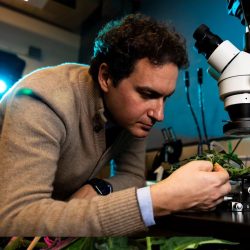 Benedetto Marelli
Benedetto Marelli
Benedetto (Ben) Marelli’s research group works in the area of structural biopolymers, biomineralization and self-assembly. By using biofabrication strategies, the research group designs bio-inspired materials that work at the biotic/abiotic interface to prevent or mitigate environmental impact. His interests and collaborative opportunities span widely across the department. He brings a wealth of experience, and a strong focus on engineering and innovation from a multiple-scale perspective with interests that include mechanical and optoelectronic properties of natural polymers, biocomposites, additive manufacturing, and emerging technologies.
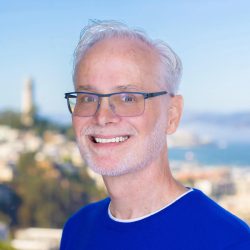 Mickey McManus
Mickey McManus
Mickey McManus is a serial entrepreneur, Senior Advisor/executive coach at BCG and a research fellow emeritus at Autodesk’s Office of the CTO. He is a pioneer in design futures, complex system thinking, augmented collective intelligence (ACI), nurturing antidisciplinary teams/cultures/ecosystems, design science, and ARPA-style “department of strategic surprise” development. Mickey holds 12 patents in the area of connected products, environments, vehicles and services and co-authored the Carnegie Science Award winning book, Trillions – Thriving in the Information Ecology. In Trillions he and his co-authors posit that in a deeply interconnected world unbounded malignant complexity will be one of the most significant challenges. Taming complexity will be a super power for individuals and organizations.
He has spent over 20 years learning how to nurture teams of interdisciplinary artists, PhD scientists, designers, anthropologists, business leaders, and engineers in building tangible “Version 1.0” proof of concept demonstrations/prototypes of novel and provocative new capabilities “from the future.” He has also spent significant time transitioning early tech and R&D research across the “valley of death” and into the world by focusing on taking ideas all the way to the value chain, ecosystem, and business model required to ship consumer products, services, and architected physical experiences.
Basically he’s a lifelong designer and community builder who got a chance to stumble into the most wonderful interdisciplinary complexity design lab back in 2001, learn from some of the most generous thinkers and doers in the world, and never looked back. Along the way he learned that focusing on the places between disciplines was where the real leverage and power emerged and helping team members celebrate their deep knowledge but also humbly listen to others outside of their domain was harder work than he thought, but far more fruitful for the creation of an innovative, creative, and successful culture. He also learned (sometimes the hard way) that when he stumbled and fell there was always someone there that could pick him up, and that people are fundamentally profoundly life-long learners who have nearly infinite capacity if we give them a chance. Most importantly he worries that if we have low expectations for someone they may just meet them. On the other hand if we have high expectations for someone they’ll grow right past them and surprise us all if we give them a safe place to learn by doing.
His current research and educational initiatives are focused on two significant threats to society that are outcomes of the rise of unbounded malignant complexity and extractive industrial/technological revolution era business models that both strip mine human cognition and the Earth’s biosphere. Much of his work is looking at generative bio economic approaches somewhere at the intersection of augmented collective intelligence, generative AI, cognitive capacity, biases, ethics, biology, and life-long learning. He’s interested in how we enable more people to think, dream and act at multi-scales and across multiple time horizons to power their own agency and emergence and support the critical work of bringing a more just world into being in times of existential threat. He believes in the power of making to learn and learning to make and figuring out when, just because we can do something, we have to have the courage to decide, we won’t.
His design innovation & digital transformation lab/agency, MAYA, was sold to BCG six+ years ago and became a foundational part of their global design and build offering called BCG X. The educational institute he funded and co-founded, LUMA Institute was acquired by Mural to become their operating system for co-creating with people and putting people first with the power of design. The generative AI-based learning engine work he helped build at Autodesk is
now being rolled out into some of their core products to team humans and algorithms and create personal dynamically assessed life-long journey pathways towards better careers in design, engineering, architecture/construction, and media/entertainment. He and his team at MAYA have won multiple Consumer Electronics Association Award, shipped the first “Matter” based consumer IoT offering and helped shape the development and early learnings for that standard that is now used by Apple, Amazon, IKEA, and many other IoT partners.
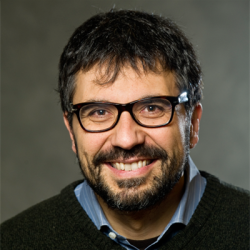 Fio Omenetto
Fio Omenetto
Fiorenzo G. Omenetto is the Frank C. Doble Professor of Engineering in the Biomedical Engineering Department and also holds appointments in the Department of Physics and the Department of Electrical Engineering. His research interests are in the convergence of technology, biologically inspired materials, and the natural sciences with an emphasis on new transformative approaches for sustainable materials for high-technology applications.
He has proposed and pioneered the use of silk as a material platform for advanced technology with uses in photonics, optoelectronics, and nanotechnology applications, is co-inventor on several disclosures on the subject. He has co-founded three companies. Prof. Omenetto was formerly a J. Robert Oppenheimer Fellow at Los Alamos National Laboratories, a Guggenheim Fellow, a Tällberg Foundation Fellow, and is a Fellow of Optica (formerly Optical Society of America), the National Academy of Inventors, and of the American Physical Society. His research has been featured extensively in the press with coverage in the most important media outlets worldwide.
 Ken Pucker
Ken Pucker
Ken Pucker is an operator, investment professional, educator, advisor, board member, and thought leader with a focus on sustainability and fashion and record of results delivery leading purposeful public and privately owned companies. An Adjunct Professor and published author in periodicals including Harvard Business Review, Stanford Social Innovation Review, Institutional Investor, Journal of Applied Corporate Finance and Business of Fashion, Ken has written extensively on topics including sustainability, ESG investing, reporting, accounting and fashion and is focused on the challenges and opportunities at the intersection of capitalism, natural capital and the climate.
Ken is an Advisory Director at Berkshire Partners, a role he has held since 2010. A founding member of the firm’s Responsible Investing Committee, he acts as a Principal Expert Advisor on environment, social and governance matters for the portfolio, performs due diligence, supports retail and consumer investments, and advises on new additions to the portfolio. Concurrently, he serves as an Adjunct Professor of Business Administration at Dartmouth’s Tuck School of Business – where he began teaching Sustainable Business Dynamics in Fall, 2024, and as a Professor of Practice at the Fletcher School of Tufts University – where he has taught Sustainable Business Dynamics and the Origins and Efficacy of ESG Investing since 2020. Ken was previously an Adjunct Professor of Sustainability at the Questrom School of Business at Boston University, where he taught Leading Sustainable Enterprisefor nine years, and was recognized by the student body as “Favorite Elective Professor” in 2020.
Ken has served on corporate and nonprofit boards since 2005, functioning as a Board Chair, Board Member, and member of Audit, Finance, Benefit & Governance, Compensation and People Development Committees for organizations including King Arthur Baking Company, Nexite, Rag & Bone, Timbuk2, Mighty Earth, Rashi School, Commonwealth School, Green City Force, and the High Meadows Institute. On the Board front, he focuses supporting CEOs, building effective teams, strategy, sustainability and results delivery.
From 1992-2007, Ken worked at Timberland, where he progressed through roles as an Operations Manager, Factory Manager, Chief of Staff, Director of Licensing, and SVP of Global Sales, Product and Marketing, to seven years of tenure as the company’s Chief Operating Officer. Highlights of his COO tenure include overseeing an increase in revenue from $1.1B to $1.6B, the delivery of record levels of net income ($165M) and cash flow ($182M), and an improvement in inventory turns from 1.4X to 4.0X with an on timeline fill rate of 96%. Following his departure from Timberland, Ken undertook another C-level role, serving as an Interim Chief Executive Officer at MBT in Romanshorn, Switzerland. In his two years at MBT, he led the turnaround of a $200M footwear company, improved cash flow by $25M, and reconceived the merchandising, manufacturing, planning and go to market approaches while expanding gross margins.
Ken began his career with tenure as a Municipal Finance Analyst at Goldman Sachs, where he supported bond issuances and refinancings, and service as a Research Associate at The Brookings Institution, where he performed research for Dr. Ralph Bryant’s book, Macroeconomic Policies in an Interdependent World.
Ken Pucker received his BA in Economics and History from Middlebury College, where he was a four-year Varsity Hockey Goalie, and earned an MS in Management from MIT’s Sloan School of Management. He lives in West Newton, MA with his wife Leslie. He is father to two daughters, enjoys reading, biking (a ten-year rider in the Pan Mass Challenge) and travel.